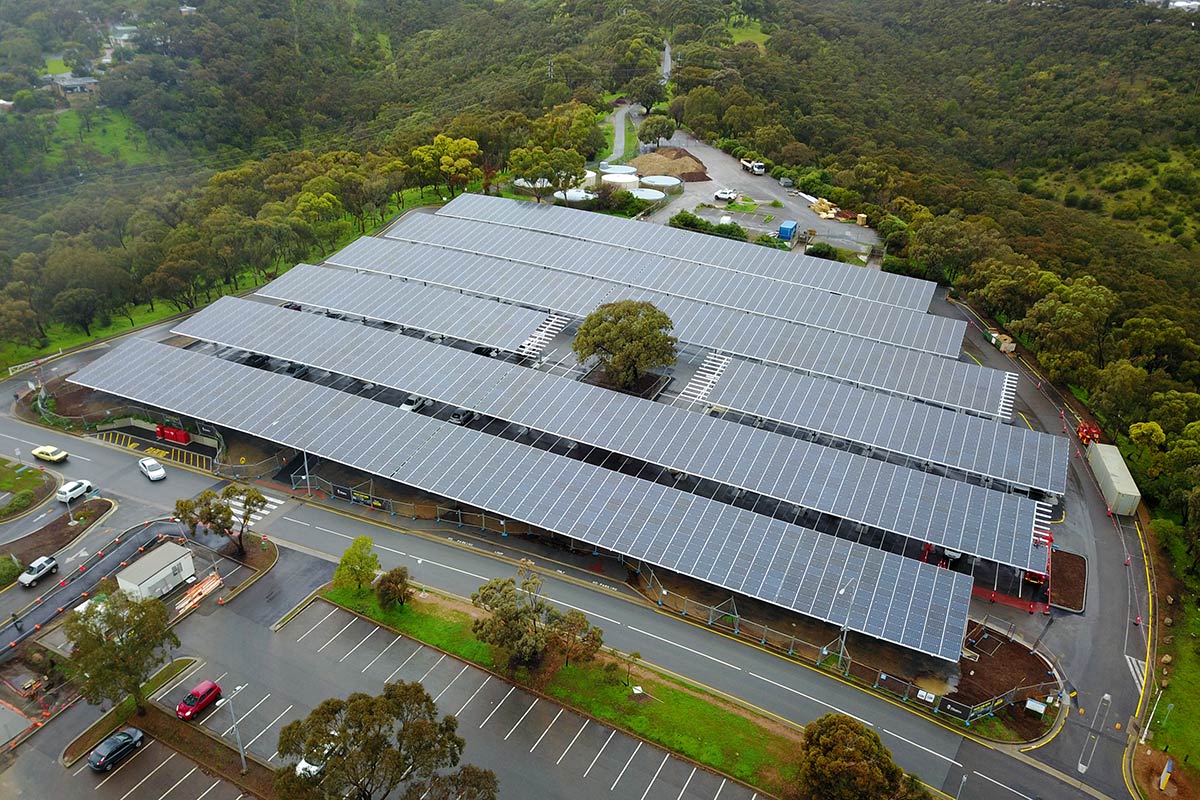
One of Adelaide’s largest solar arrays will soon provide one-fifth of the electricity needed to power Flinders University’s Bedford Park campus.
The project also sets the scene for the introduction of autonomous campus shuttles run on renewable energy.
Vice-Chancellor Professor Colin Stirling says the project involves the installation of 5,817 solar panels at Flinders’ Bedford Park campus, demonstrating continuing commitment to renewable energy and complementing Flinders’ reputation for exceptional research into clean energy technologies.
“We’ve built a massive solar array of 4136 panels over an existing car park to create a solar car-port, plus installed a further 1681 panels across six roof-tops, that collectively will generate 20% of the University’s electricity needs,” Professor Stirling says.
“The solar car-port will include a charging dock for recharging planned autonomous shuttles that will ferry people across campus from the future Flinders rail station. We’ve made provision for charging points for plug-in electric vehicles, to encourage their use on campus by providing access to free solar energy.

Flinders University Vice-President (Corporate Services) Mark Gregory says Flinders’ main campus has a large number of people and uses a significant amount of resources.
“We have an opportunity to do things in a way that is different, and we should be looking at ways that we can all live in the future,” Mr Gregory says.
“In demonstrating some of these more progressive ideas our campus can become a place where we live and breathe and create a living laboratory for new technologies, sustainable activities and new behaviours,” he says.
Professor Stirling says the project adds to existing solar arrays on the University’s new Student Hub, and Law and Commerce Buildings, illustrating Flinders’ increasing commitment to environmental sustainability.
“At Flinders we genuinely believe in our mission of changing lives and changing the world for the better,” Professor Stirling says.
“This investment in on-site renewable energy generation at our Bedford Park campus will contribute to decarbonising the energy grid in South Australia and elevate Flinders as a leader in the use of solar to support the sustainable operation of its campus and facilities.
“While we are improving our operational costs, we’re also providing an opportunity for our researchers to test ‘real world’ deployment of renewable energy technologies on our localised electricity grid at Bedford Park, as we create a more robust system with flexible forms of supply.
“There will also be many opportunities for this project to be used in our teaching and learning to expose students to the latest in renewable energy technology, engineering, civil and transport system development.
“Ultimately we want to create campus environments that enable students and staff to experience the technology of the future – and partner with industry, government and the community to maximise the benefits to all,” Professor Stirling says.
Flinders Solar Project fast facts:
- A solar car-port in car park 3 will generate electricity from 4136 solar panels and provide bonus shade and protection for cars.
- 1,681 solar panels have additionally been installed across six buildings on the main campus – Information Science and Technology, Engineering, Physical Sciences, Student Centre, Health Sciences, and the Health Sciences Lecture Theatre complex.
- It is in total one of South Australia’s largest solar arrays to date, generating the equivalent of nearly 20% (19.3%) of Flinders’ core campus electricity needs through clean, renewable solar energy.
- The 1.8MW system will generate an estimated 2700MWh per annum. It further cements South Australia’s status as a leader in renewables, expanding on other recent initiatives such as the Adelaide Airport’s 1.2MW system, the new Royal Adelaide Hospital 1MW microgrid, and the 1MW rooftop system at the Royal Adelaide showgrounds.
- The project is a sustainable financial investment. Costing $4.895 million it is expected to pay for itself within seven years and will continue to generate energy for the rest of its expected life of 25 years.
- It’s expected Flinders will be ready to flick the switch to enable this project to generate clean, green electricity from October.
- It will be one of the first deliverables in the University’s updated sustainability plan currently being developed in consultation with the University community, and scheduled to be released next year.
- The draft sustainability plan positions Flinders to achieve zero net emissions from electricity by 2020. Flinders also aims to reduce campus electricity demand by 30% from a 2015 baseline, through renewable energy generation and storage.
- Autonomous electric shuttles planned to carry students around campus and to the new Flinders train station will be able to dock in car park 3 and top up their batteries. Provision has been made for six future charging points for plug-in electric vehicles.
- Improved access to car parks 2 and 3 and dedicated pedestrian walkways will benefit the campus community plus pedestrians and cyclists between the campus and Bellevue Heights.
- A following stage of the project will see sections of covered walkways incorporating solar generation installed between car park 3 and buildings on the North Ridge of our Bedford Park campus.
- The solar car-port was designed and constructed by Solgen Energy and Tonkin Schutz, along with with technical consultants Lucid Consulting, Wax Design and other sub-contractors.

